© 2025 Department of Design, IIT Hyderabad
Last Modified Date on 31st December 2025
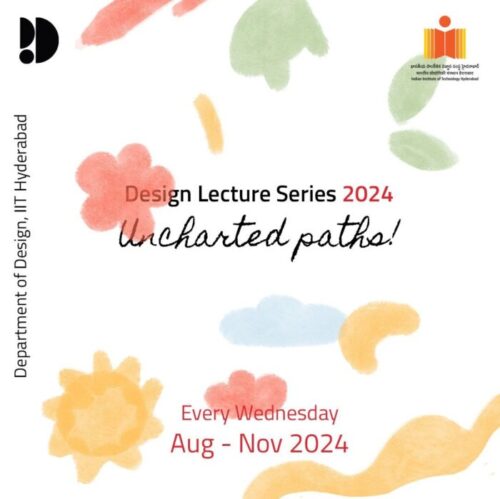
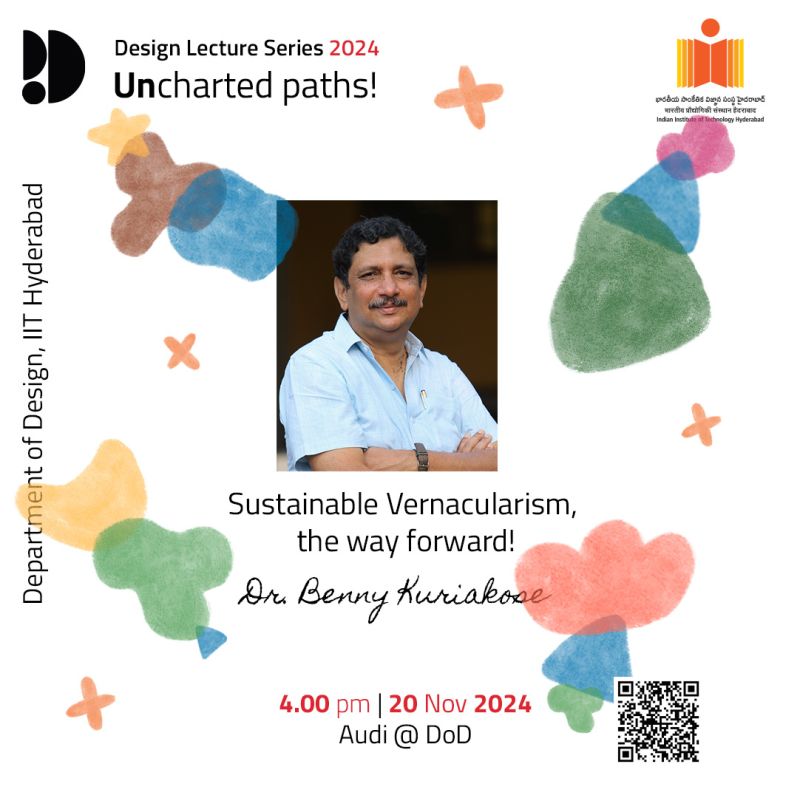
The Department of Design invites you to join the final talk in the Design Lecture Series by Dr.Benny Kuriakose on 20 November 2024.
Talk abstract:
Sustainable Vernacularism, the way forward!
Climate Change and Global warming are around the corner and it has become a reality affecting the present generation. Still we are not giving enough attention to this topic except in seminar halls and workshops. Dr. Kuriakose is arguing that we are making some fundamental mistakes in our thinking and actions. We have to study the roots of the problem on why things are happening. We have to understand that technology cannot compensate for poorly thought out architecture. There is a huge gap between academia and practice.
There has been a tendency in India to look to the west and to try and imitate western modes of living. There has been a widespread adoption of western architectural styles that have been copied and pasted across its landscape, forgetting the value the indigenous building practices bring. It is important to move towards sustainable vernacularism which has roots in India’s rich architectural heritage, instead of blindly following the western model. Dr. Kuriakose looks towards the embedded knowledge in the vernacular architecture of different regions whether it is in the design principles or the use of local and renewable materials.
He sees conservation of our old buildings as developing the architectural sphere through adaptive reuse and as a means to create more sustainable architecture while preserving the building’s inherent heritage and historical values. The approach he has chosen to take towards sustainability goes beyond certifications which often function as general checklists and tools for greenwashing.
Profile of the speaker:
Dr. Benny Kuriakose, the man behind Benny Kuriakose and Associates – an architectural and conservation consultancy firm that was established in the year 1991. Having started his career in 1984, Dr. Benny received his basic architectural lessons under the tutelage of the renowned architect Laurie Baker. In 1986, he received the Charles Wallace India Trust award that enabled him to complete his MA in Conservation Studies from the University of York. In 2001, he received the Inside Outside Designer of the Year award and again in 2012, he received the Celebration of Architecture award. While practicing he decided to pursue his research interests in mass housing and graduated from the Indian Institute of Technology, Madras with a doctorate in 2015.
Benny has authored the book ‘Conserving Timber Structures in India’ and one of the editors for the book ‘ Guidelines for the Preparation of a Heritage Management Plan’. He has offered his services as consultant to UNDP, UNESCO, various State Governments and other organisations. He has also worked as a consultant for the United Nations Development Program (UNDP), UNESCO, different state governments, and non-governmental organizations.
https://lnkd.in/g_79FRxM
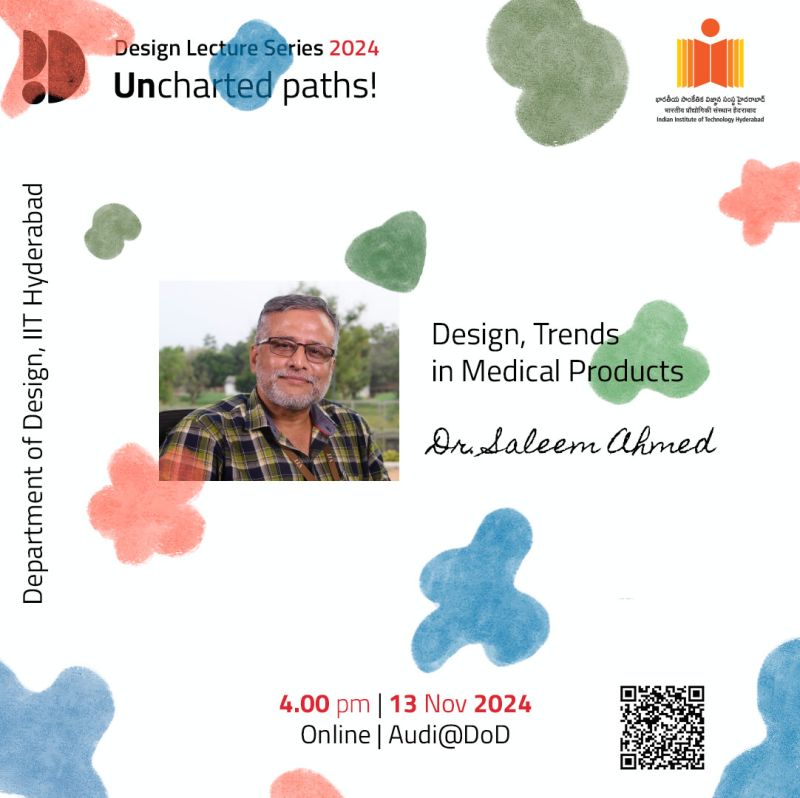
The Department of Design invites you to join the talk in the Design Lecture Series by Saleem Ahmed on 13 November 2024.
Talk abstract:
DESIGN, Trends in Medical Products
“Design” plays a pivotal role in the development of modern medical products, influencing not only aesthetics but also functionality, user experience, and regulatory compliance. Current design trends in medical products are being driven by factors like technological advancements, an emphasis on patient-centered care, and the need for sustainable solutions.
Today, medical products are increasingly designed with the user in mind, aiming to be intuitive and accessible for a broad demographic. This approach considers the needs of patients, healthcare providers, and caregivers, especially as more devices are intended for at-home use. This trend toward accessibility ensures that devices can be effectively used with minimal training.
Medical products are being designed to seamlessly integrate with digital health platforms, enabling real-time data collection, analysis, and remote monitoring. Artificial intelligence is being incorporated into the design of medical devices, enabling features like predictive analytics, which can detect patterns and predict health issues. This intelligent design enhances patient safety and device longevity. Advances in microtechnology are allowing designers to create smaller, more portable devices without compromising functionality.
The talk will cover the process of dealing with contemporary medical product design and the nuances of keeping up with the current trends in the field.
Profile of the speaker:
Dr. Saleem Ahmed is currently a Professor of Industrial Design at VIT School of Design (V-SIGN) in VIT, Vellore. He is the founding Dean of V-SIGN (2018-2022) and former Head of MDes Program (2016-2018) in VIT. He was involved in establishing the MDes, BDes, and PhD programs in VIT, Vellore.
He holds a B.E. degree from NIT, Tiruchirappalli, M.Des. degree from IDC, IIT Bombay, and a PhD from IISc, Bangalore. He spent over 20 years in the industry and was involved in successfully designing and developing over 200 consumer products for the international market. Later, he moved on to academics and involved in research and teaching. His areas of interest in research are Product Aesthetics, Product Semiotics, and Medical Product Design. He has been teaching courses on these areas to BDes and MDes students for the past two decades.
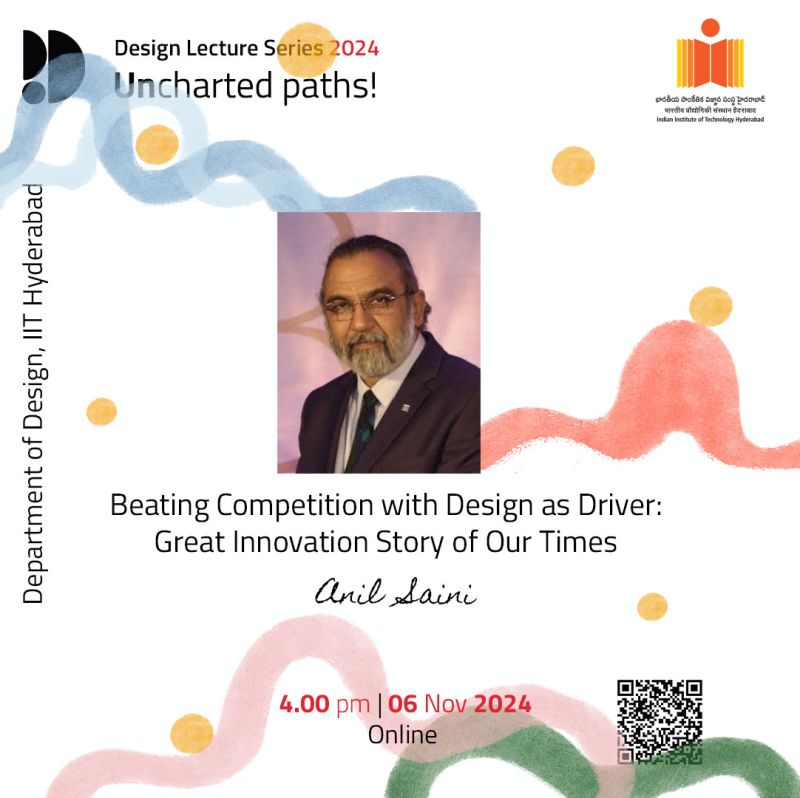
The Department of Design invites you to join the talk in the Design Lecture Series by Anil Saini on 6th November 2024.
Talk abstract:
Beating Competition with Design as Driver: Great Innovation Story of Our Times
In 1970-80’s the Swiss watch market was very competitive. Swiss watches, long considered the gold standard of timepieces, were being outpaced by quartz-powered digital imports from Japan that were cheap to produce and cheap to sell. Faced with the choice of buying a quality watch for a premium price or opting for a bargain digital model, an increasing number of consumers were choosing the imports. Business was down, factories were closing, and jobs were being lost.
One such company which was once successful, was facing issues like others. They bought an injection molding machine and resorted to making plastic watches. They spent months crafting a plastic prototype of a molded watch. It economized the entire process, turning watches from handcrafted units to models that could be produced by automation. They had produced a timepiece that was both durable and inexpensive.
Still the issue was why someone might opt for a plastic analog watch over a digital Japanese model? Company believed that the idea of a “Swiss watch” still held wide appeal in the same way someone might opt for a real Chicago deep-dish pizza over an imitator’s version.
The manufacturing process that allowed watches to come in at a reasonable price was also a problem! Automating the process meant the watches and bands were almost always identical in size and shape. If the watch’s general appearance couldn’t be changed, how could it stand out? Company used innovative and great Design and Marketing to combat the situation!
Profile of the speaker:
Mr. Anil Saini has made a significant contribution to the automotive design eco-system of the country. After graduating from IDC, IIT Bombay in 1985; he joined Bajaj Auto Ltd. and later served in PTC, General Motors and TCS. As designer he designed the famous scooterette Sunny and several other scooters at Bajaj. Also, under his leadership GM Studio designed various production and concept vehicles like, Chevrolet Tavera, Spark, Beat, Electric Spark (a concept displayed in 2010 New Delhi Auto Show) and a mini-SUV concept Adra (displayed in 2014 Auto Show). His large body of work includes developing automotive studio infrastructure, personnel, methods and processes in the country. He started and developed several new automotive studio practices in the country like Digital Modeling, Color & Trim, Perceived Quality etc. Passionate about teaching and mentoring, he contributes to various schools, institutions and individuals.
PS: There will be a small exercise planned at the end. Please be ready with some image editing softwares such as GIMP/ Photoshop.
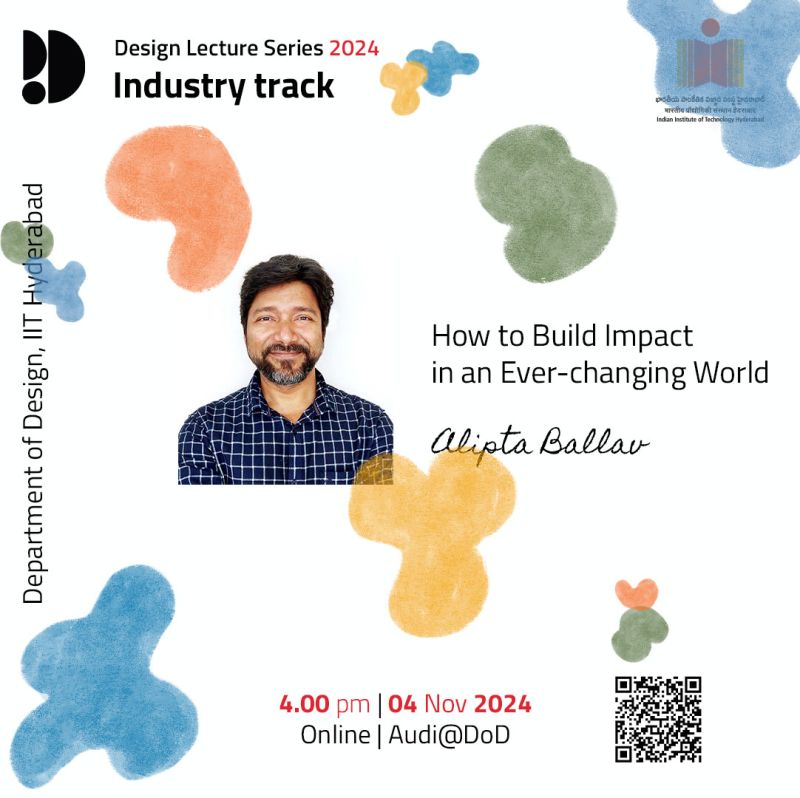
The Department of Design invites you to join the talk in the Design Lecture Series by Alipta Ballav on 4th November 2024.
Talk abstract:
How to Build Impact in an Ever-changing World
The design landscape is constantly evolving, and to stay relevant, we need to create meaningful impact at every step. In his talk, he will explore how designers can build and sustain that impact in an ever-changing world.
Profile of the speaker:
A seasoned Design professional with over 2 decades of industry experience spanning across B2C and B2B working at the intersection of people, process, product. In the current role, he is leading product design for Microsoft India for the Industry cloud Retail solutions at the Bangalore studio.
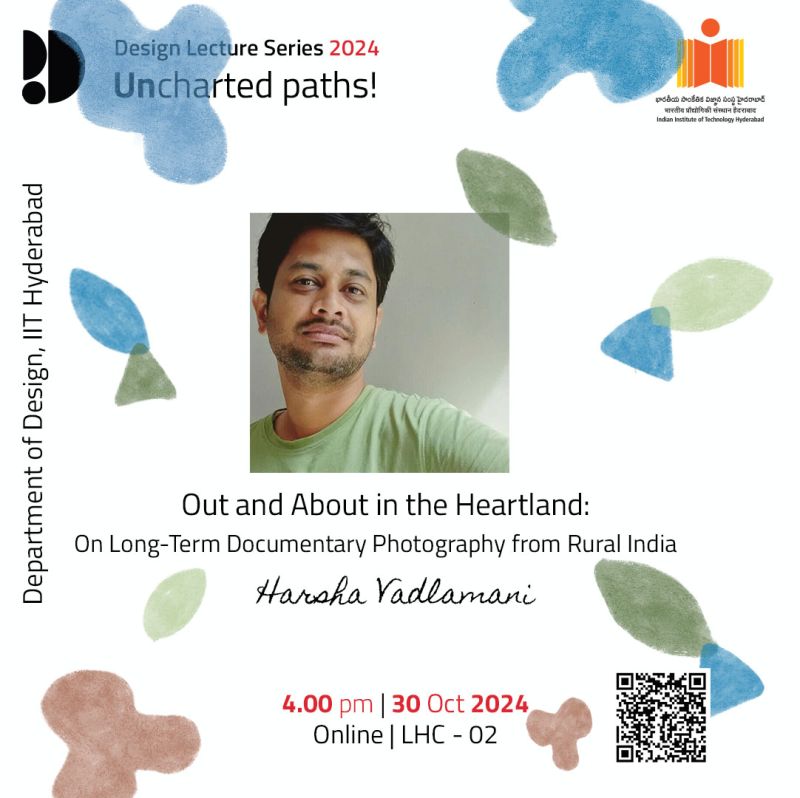
The Department of Design invites you to join the talk in the Design Lecture Series by Harsha Vadlamani on 30th October 2024.
Talk abstract:
Out and About in the Heartland: On Long-Term Documentary Photography from Rural India
Over the past eight years, Harsha Vadlamani has spent several months documenting Punjab’s farming crisis. Taking an unhurried approach to documentary photography and journalism, his work explores the many challenges facing agrarian communities in Punjab today, sixty years after the Green Revolution was introduced. It looks at the questions of food security and sovereignty in the face of depleting water resources, pollution, farm debt and suicides, widespread cancers and kidney disorders, and out-migration. Harsha will talk about his work from Punjab and long-term engagement with communities, building connections and trust, and paying attention when few others are listening.
Profile of the speaker:
Harsha Vadlamani is an independent photojournalist, filmmaker and National Geographic Explorer whose work explores the many inequalities that influence migration, health and the environment, with a particular focus on rural and indigenous communities across India.
His work has appeared in National Geographic, The New York Times Magazine, The Wall Street Journal, GEO, Al Jazeera, Le Monde, Financial Times Magazine, Rest of World, CNN, BBC, Scientific American, Foreign Affairs, Neue Zürcher Zeitung, Nature and Wired, among other publications. He is a National Geographic Society grantee and recipient of Amnesty International’s Media Award for Photojournalism, 2022.
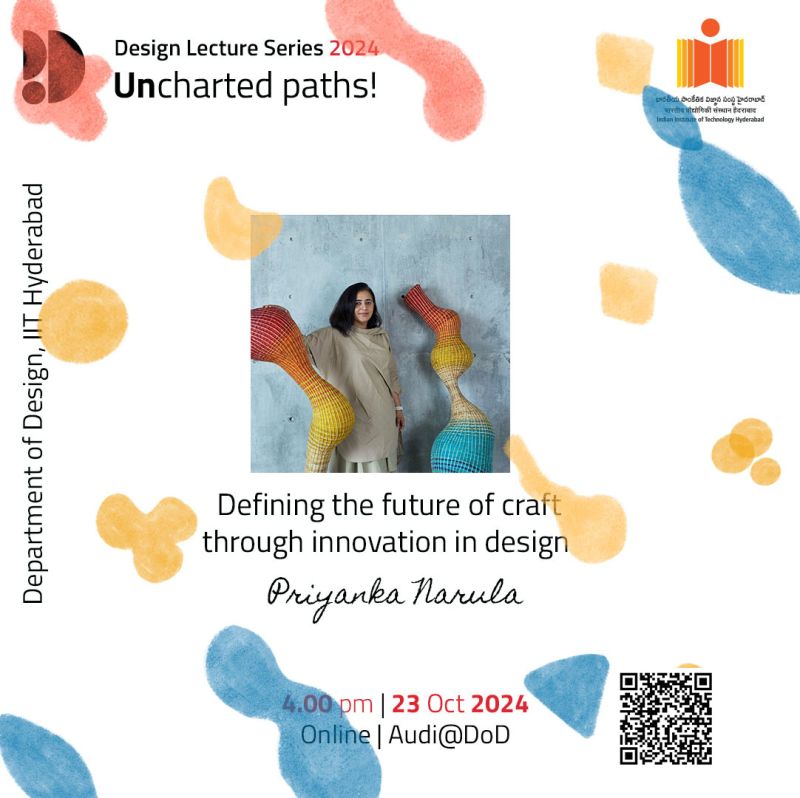
The Department of Design invites you to join the talk in the Design Lecture Series by priyanka narula on 23rd October 2024.
Talk abstract:
Defining the future of craft through innovation in design: Experience from The Wicker story
The Wicker story is a design and manufacturing studio that was founded in 2019 by Priyanka Narula. The studio started out as a response to a prolonged quest to define the future of craft-based design in the Indian context. Their work attempts to bridge art, architecture and product with parametric craft design methodology while celebrating the culture, colours and traditions in India. The talk is a walkthrough of their working methodology and design processes in the sphere of contemporary woven craftsmanship while working with digital tools of design exploration.
Profile of the speaker:
Priyanka Narula is the Founder & Principal Designer of The Wicker Story With a professional degree in architecture from the renowned IAAC Barcelona, Priyanka Narula is attempting to redefining Indian wicker craft. Since founding The Wicker Story in 2019, her design studio has become a symbol of inventive fabrication, creating expansive art installations, sculptures, and furniture that push the boundaries of traditional cane and rattan craftsmanship. Priyanka’s work blends modern design with alternative manufacturing methods to create complex geometries, while staying rooted in local craftsmanship. By employing local weavers and artisans, her mission is not only to elevate the craft but also to ensure its cultural preservation and overall growth. Her design studio since its conception has won various awards including the prestigious AD x JSW Prize for Contemporary Craftsmanship 2024, Red Dot Award: Design Concept 2024 for Sunset bench, Winner of craft innovation Lexus Design Award 2022, EDIDA furniture design of the year 2019 and many more.
https://lnkd.in/gUucv7SP
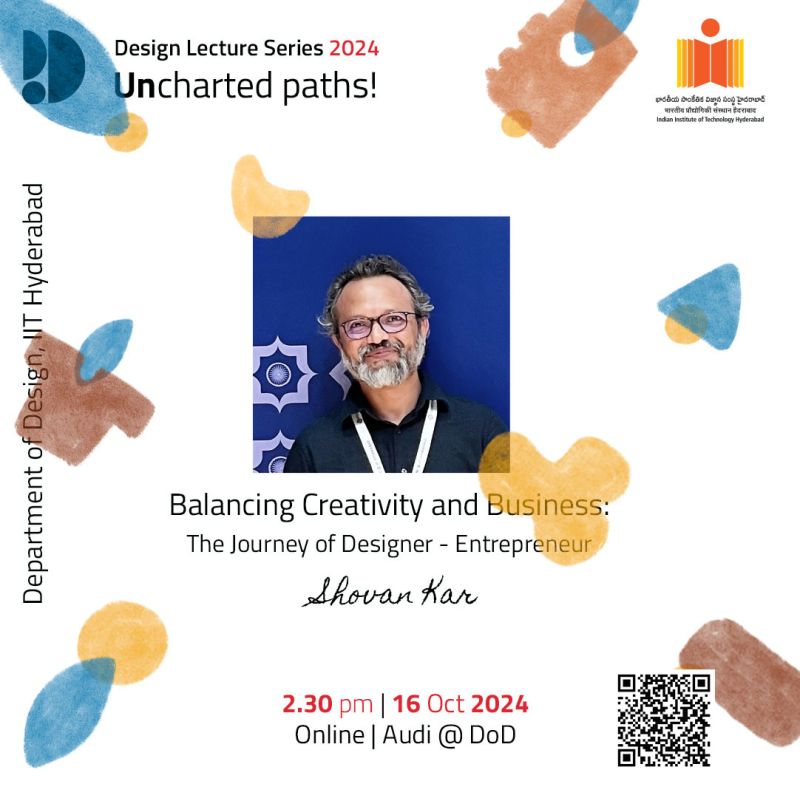
The Department of Design invites you to join the talk in the Design Lecture Series by Shovan Kar on 16th October 2024.
Talk abstract:
Balancing Creativity and Business: The Journey of a Designer – Entrepreneur
As a designer, we’re constantly exploring your creative potential. But what happens when you take that creativity into the business world? This talk explores the exciting yet challenging journey of being a designer entrepreneur. We’ll dive into how designers can transform their ideas into successful businesses, balancing creative passion with the realities of management, growth, and profitability. Through real-life stories and practical advice, you’ll learn how to navigate the entrepreneurial world without losing your creative spark. This journey isn’t easy, but with the right mindset, it’s an incredibly rewarding path!
Profile of the speaker:
Shovan is a Designer and Mechanical engineer with a Master’s in Design from IIT Hyderabad and a degree in engineering from NIT Silchar. He has worked with aerospace institutes like NAL and GTRE on fighter aircraft design research and in Korea designing custom trucks for the service industry. Before starting his own ventures, Shovan spent almost a decade at Philips Innovation, in Industrial product design.
As a designer, He is deeply passionate about addressing societal and environmental challenges, with a strong belief in sustainability and the circular economy. He views design as an ongoing journey of learning and evolution. In 2017, Shovan embarked on his design entrepreneurship journey as the Founding Partner and Design Director of Design Objects, Petsfurn Pvt Ltd, and Project Hygieia LLP.
A key turning point in his journey came during Master’s at IITH, where the concept of ‘luxurious furniture for pets’ was born. Recognizing a gap in the Indian market for premium pet furniture, the group transformed this idea into a thriving business catering to this unique demand. Shovan attributes his design education at IITH was instrumental in shaping both his creative approach and entrepreneurial mindset, allowing to adapt, collaborate, and evolve seamlessly by blending creativity with empathy and practical problem-solving.
Over the past two decades, Shovan and his team at Design Objects have designed more than 500 products across diverse industries such as defence, consumer goods, furniture, medical devices, and lighting. The team manages every aspect of the process, from problem identification to final production, covering engineering, manufacturing, and packaging design. With expertise from designers, engineers, architects, and artists, we bring a holistic approach to every project.
www.designobjects.in
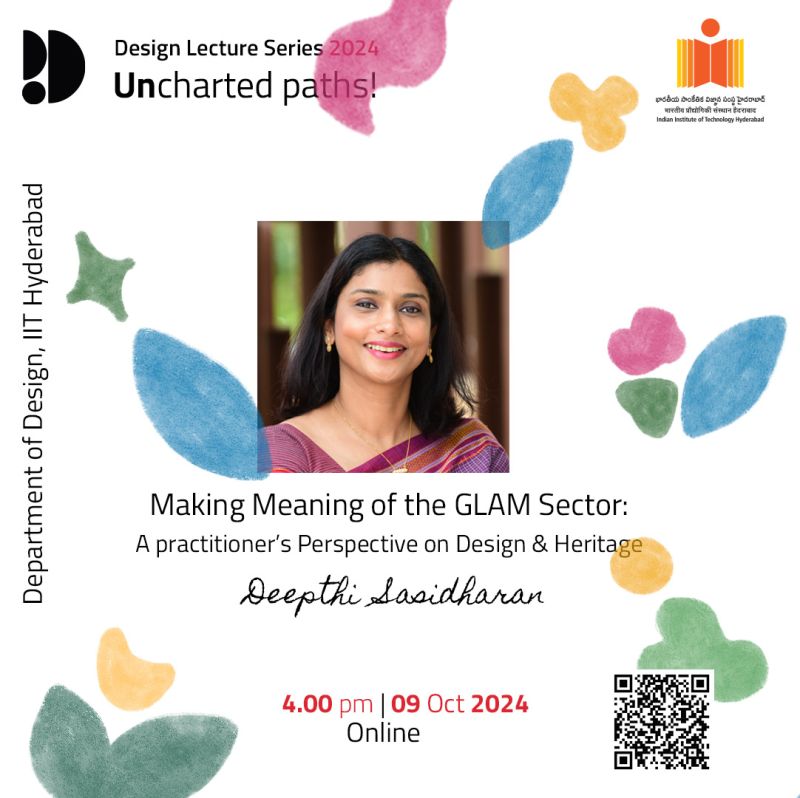
The Department of Design invites you to join the talk in the Design Lecture Series by Deepthi Sasidharan on 09th October 2024.
Talk abstract:
Making Meaning of the GLAM Sector: A practitioner’s perspective on Design and Heritage
As India explodes into a new era of heritage discovery, an increasing number of spaces open up for designers of all kinds – exhibition, graphic, lighting, sound, AV, AI etc where they interact with traditional guardians like archivists, museologists, collection managers who look after cultural and material heritage. This talk will focus on how to understand the world of GLAM heritage – a popular acronym for galleries, libraries, archives and museums and how design is documented in these sectors. Also look at ways to build tools to understand and enable communication between designers and heritage professionals. Cultural preservation and heritage needs design intervention and direction more than ever and we look at possibilities of collaboration.
Profile of the speaker:
Deepthi Sasidharan is an art historian, curator and founder Director at Eka Archiving, a cultural advisory and works on heritage and museum projects across India with the government, private and corporate clients. Deepthi has led Eka projects that have been path-breaking in India, including setting up museums, seminal exhibitions and the creation of archives like those for Kalakshetra, Chennai, Mumbai Police and Tata Trusts, Mumbai.
A Fulbright and Fundacao Oriente scholar, an Ink Fellow, she has curated, spoken and published extensively on 19th century photography and has worked on photography collections at IGNCA and IGMT, New Delhi, and Chowmahalla Palace, Hyderabad and several private collections. Deepthi lives in Mumbai and is the co-author of Indira: A Life of Courage (2017) and Treasures of the Deccan (2018).
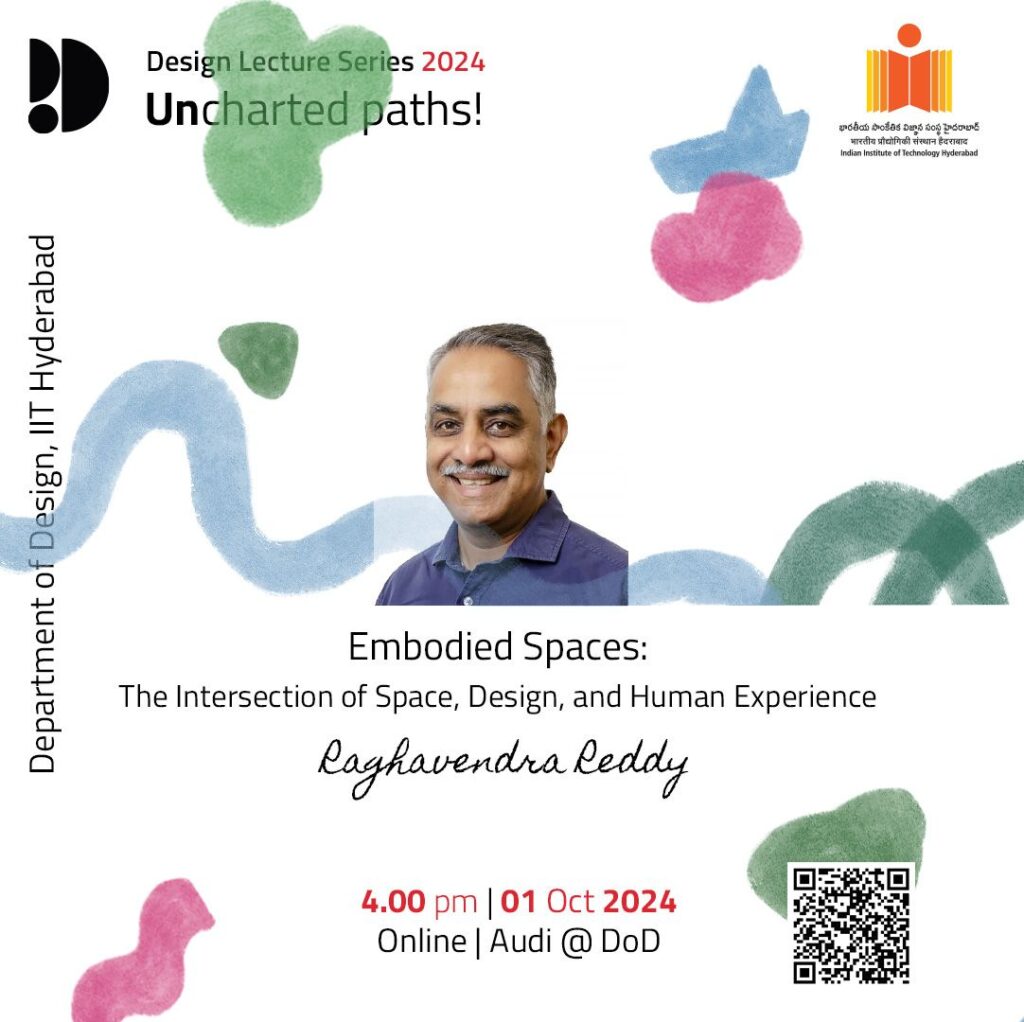
The Department of Design invites you to join the talk in the Design Lecture Series by Prof. Raghavendra Reddy Gudur on 01st October 2024.
Talk abstract:
Embodied Spaces: The Intersection of Space, Design, and Human Experience
Experiential Graphic Design (EGD) is a transformative discipline that merges elements of architecture, graphic design, product design, and digital technology. It creates immersive environments that not only communicate messages and tell stories but also enhance the user experience in physical spaces. In this talk, we will explore the fundamentals of EGD, focusing on how design elements such as signage, wayfinding systems, and interactive displays are used to shape the way people navigate, understand, and engage with their surroundings. By blending form and function, EGD transforms spaces into memorable, intuitive experiences and plays a critical role in both public and commercial environments. This introductory talk will provide an overview of key concepts and current trends in the field, inspiring you with the potential impact of EGD.
Profile of the speaker:
Gudur Raghavendra Reddy (Raghu) is a course leader for the Bachelor of Interaction Design and Master of Design Strategies at the School of Design, University of Canberra. His academic journey is a testament to his diverse background, which includes a PhD in Design from the Queensland University of Technology, a master’s degree in visual communication from the IIT, Bombay, and a professional 5-year diploma in fine arts.
His research is dedicated to making contemporary digital products and services more accessible to older individuals and those with diverse capabilities, focusing on ambient technologies that support aging in place with dignity. Raghu’s path to academia was paved by years of industry and research experience, including work in interactive multimedia, online distributed virtual environment games, and medical visualisation. Beyond his academic endeavours, Raghu likes to travel to pursue his passion for black-and-white photography. On gloomy, cold, rainy days, he can be found on his maker bench building, which some say, useless gadgets to create a safer and lazier world.
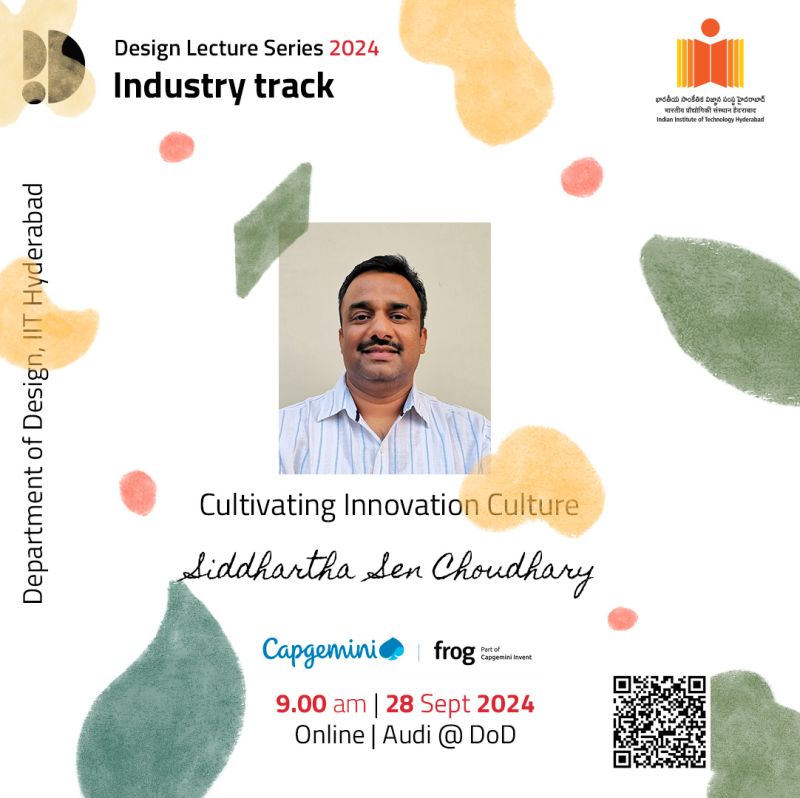
The Department of Design invites you to join the talk in the Design Lecture Series in Industry track by Siddhartha Sen Choudhary (Sid) of ‘frog design India’ on 28th September 2024.
Talk abstract:
Cultivating Innovation Culture
In today’s fast-paced and competitive landscape, fostering an innovation culture is essential for organizational success and sustainability. Session will explore the foundational elements of an innovation culture, including leadership commitment, employee empowerment, and collaborative environments. We will explore the essential role of psychological safety, demonstrating how it empowers employees to take risks and embrace experimentation without fear of failure. Session focuses on helping organizations to cultivate a vibrant innovation culture that not only drives growth but also adapts to changing market demands.
Profile of the speaker:
As head of Innovation Strategy and design at frog India, Siddhartha has around 19+ years of experience in designing interactions and digital experiences across various mediums and industries. Siddhartha is a National Institute of design, Ahmedabad graduate (masters in Information and digital design). Before joining frog in 2017 as leader of frog Delhi studio, Siddhartha built and led the design team at Samsung. In the past, he has worked with SAP Labs, GlobalLogic, NOKIA and July Systems (now part of CISCO). His expertise lies in design direction for Enterprise and Consumer Products, defining and implementing Design Language systems for consistent user experience across products.
As an Interaction designer, Siddhartha has designed for consumer and enterprise user experience in Healthcare, Education, Retail, Sports and media, Finance, telecom, Oil & Gas, Railways & many more……….
He has designed for a wide range of mediums ranging from Web, Desktop apps, Mobile, Tablet, Kiosk, SmartTV, Smart watch and digital experience for consumer electronics (Refrigerator, Washing machine). Siddhartha holds 2 A-grade design patents for Smart Ring (Wearable electronic ring device) in 5 geographies i.e. US, China, South Korea, India, Europe. Recently launched Samsung galaxy ring based on the same patent.
https://www.frog.co/
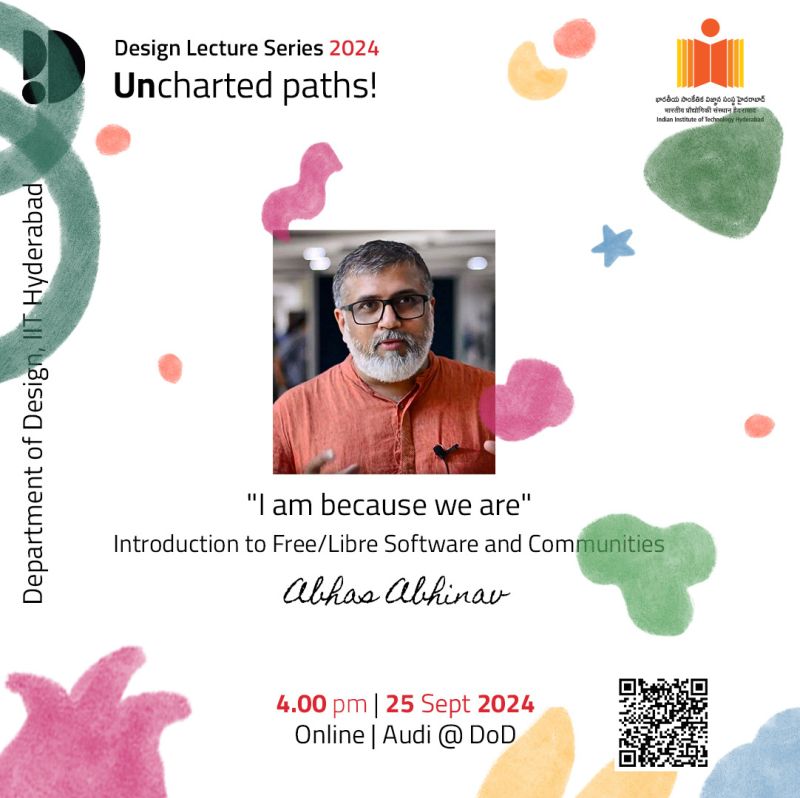
The Department of Design invites you to join the talk in the Design Lecture Series by Abhas Abhinav on 25th September 2024.
The talk is powered by https://bigbluebutton.org/
Talk abstract:
“I am because we are”
Introduction to Free/Libre Software and Communities
Do we really exist in isolation? What role do the communities that we belong to, draw from and contribute to play in sustaining and enriching our lives? Over four decades, the free software movement has used a very unique technique (licenses) to safeguard expressions in software, art, documentation, writing and more. These licenses “safeguard” the freedom embodied in these creations which affect our ability to use them, understand them, remix or modify them and share them with others.
During this talk, we will discuss how these licenses define, protect and promote the ideas of free/libre software. We will also understand the value of these “public goods” that are created and sustained via these licenses and the significant role they play in our lives.
Profile of the speaker:
Abhas is a hacker, entrepreneur and free software activist.
He is the founder of DeepRoot GNU/Linux, an twenty-four-year-old Free Software Business that provides support, services and solutions for Free Software deployments. DeepRoot builds mail servers and clusters, provides hosting & support for a variety of Free Software tools and helps organisations of all sizes choose self-hosting for their infrastructure in general.
Abhas also leads a hardware venture called Mostly Harmless, where he experiments with and builds Libre and Liberated Hardware (like wireless routers, mechanical keyboards, computers, lights, mobile phones, home automation solutions and more). The goal is to build and sell hardware put owners in control of their lives by enabling them to run free/libre software on more hardware than usually possible. Mostly Harmless operates the LibreTech.Shop – India’s first store for hackable and ethical products that offer convenience.
Abhas is a member of the Free Software Foundation of India working group and has been a participant in the free software community in India for over 25 years.
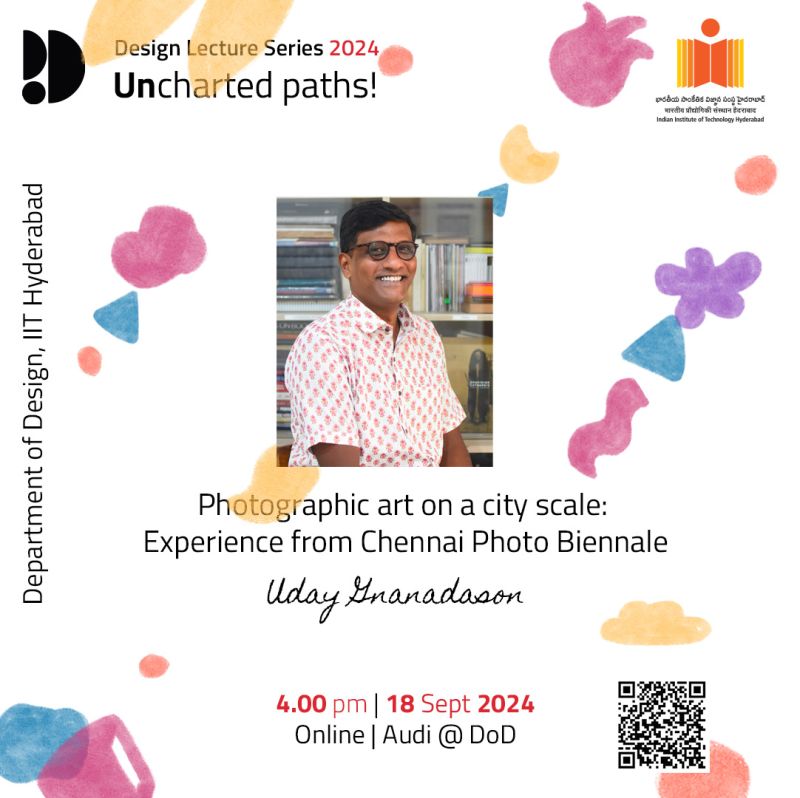
The Department of Design invites you to join the talk in the Design Lecture Series by Uday Isaac Gnanadason on 18th September 2024.
Talk abstract:
Photographic art on a city scale: Experience from Chennai Photo Biennale
The first edition of Chennai Photo Biennale’s (CPB) was in 2016, as a response to the growing need for educational and collaboration opportunities in the field of photographic art in South India. Since then CPB has grown in stature and in scale, using both city spaces and architectural facades to design photographic experiences to reach a wider audience beyond the borders. Today the community’s participation in CPB and in the process of image making has a larger audience than ever before. The talk is a walkthrough on the effort behind setting up of city scale exhibitions for photographic art and CPB foundation’s efforts to promote photographic art as a vital channel of representation and self-expression to bring together communities via socio-political and socio-cultural discussions.
The fourth edition of the Chennai Photo Biennale poses the question, ‘Why Photograph?’ and unfolds a set of inquiries into our relationship with photography. In this era of visual saturation, CPB4 brings together slower approaches to image making. It showcases a diverse range of artists who are reshaping dominant narratives by addressing gaps in representation, remixing colonial visual vocabularies with native avant garde aesthetics, and shifting the gaze from the lone photographer to forge an ethic of care and collective authorship.This year’s CPB opens on 20th December 2024.
Profile of the speaker:
Uday takes on the role of Associate Director, Education & Partnership at CPB foundation. He is a seasoned management professional with a background within the development and social impact sectors. With a passion for driving sustainable and strategic development initiatives, he is committed to empowering and contributing to the upliftment of underserved communities, with a particular focus on the intersection of art and wellbeing. His expertise encompasses a broad range of areas, including festival management, exhibition design, program design and management, social-emotional learning (SEL) art pedagogy training, program monitoring and evaluation. Throughout his 20+ year career, he has developed a unique set of skills, having worked in various capacities across multiple roles, sectors, and geographies.
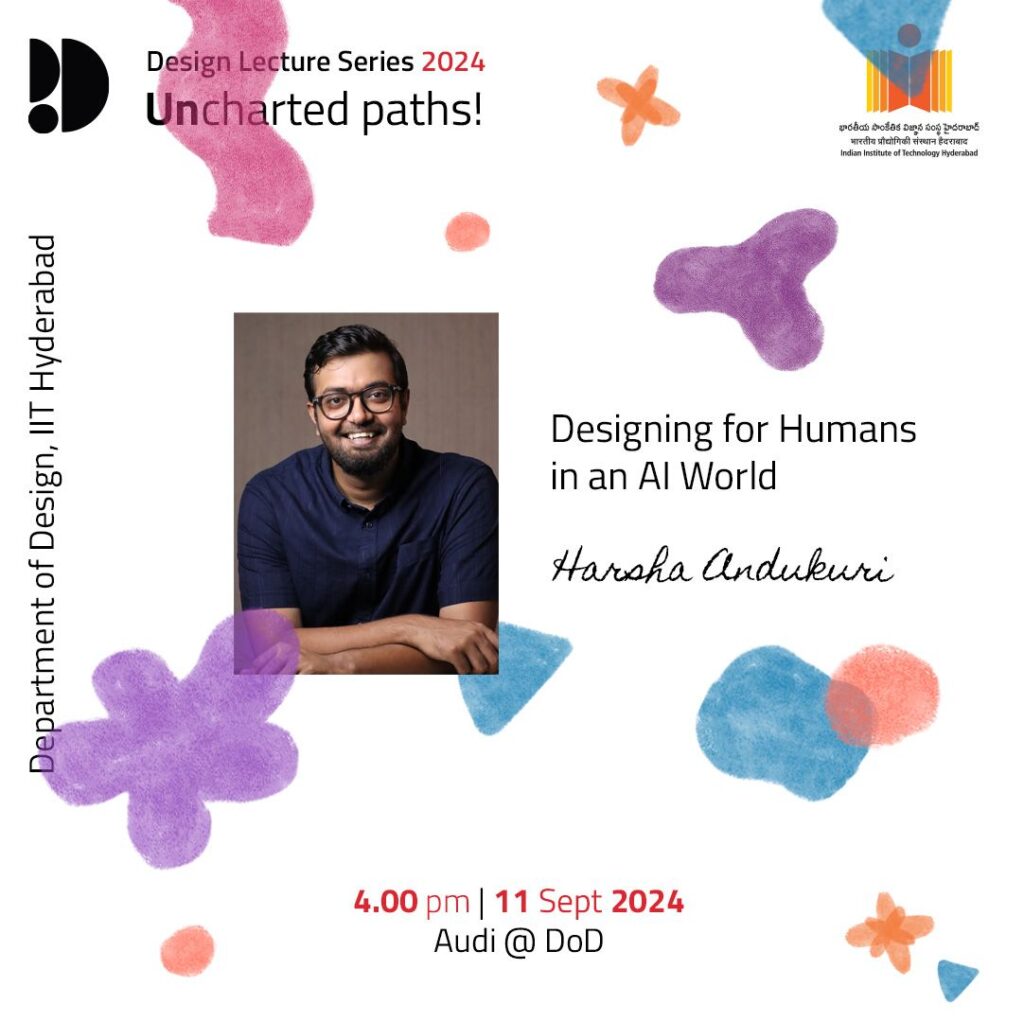
The Department of Design invites you to join the talk in the Design Lecture Series by Harsha Andukuri on 11th September 2024. All are welcome!
Talk abstract:
Designing for Humans in an AI World
Gen AI is rapidly evolving, transitioning from a specialized tool to an increasingly integrated aspect of our lives, blurring the lines between human and machine interaction. As designers, understanding and responding to human emotions and needs becomes vital. This talk will explore how empathy can be the guiding star in crafting Gen AI experiences that are functional and truly resonate with users. We’ll delve into real-world examples of Gen AI applications where empathy-driven design has made a significant difference and discuss strategies for incorporating human-centred design principles into Gen AI development.
Profile of the speaker:
Harsha is a Product Design Manager at ServiceNow, where he is working on the future of the workplace. With over a decade of experience in Enterprise B2B Software, Harsha specialises in Artificial Intelligence (AI), Productivity apps and Software platforms. Harsha studied Master’s in Design at IIT Guwahati and did his Bachelor’s in Architecture at NIT Patna. Harsha loves to share his passion for User Experience and Graphic Design through talks and lectures at prestigious universities and design events. Besides design, Harsha loves to paint and read books on Wealth Management, Negotiation and Building High-performance teams.
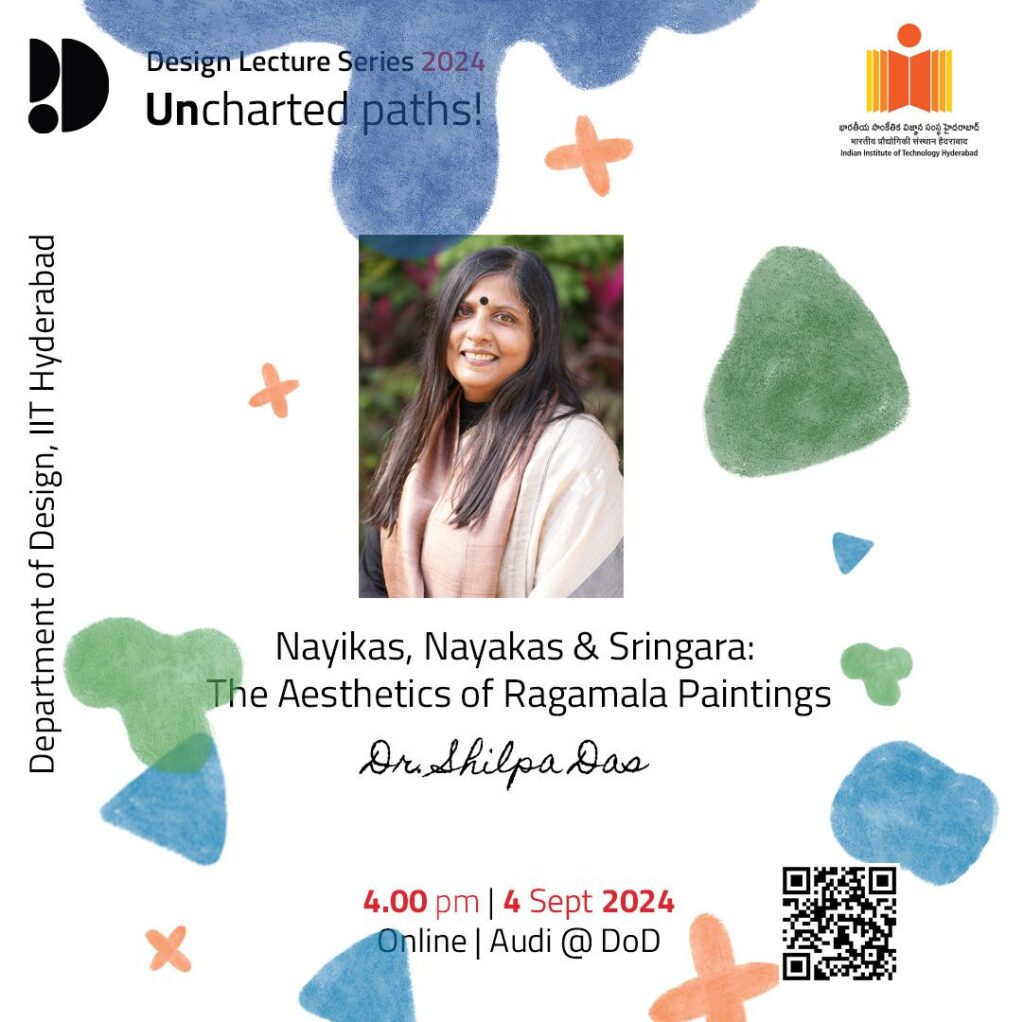
The Department of Design invites you to join the talk in the Design Lecture Series by Prof. Shilpa Das on 4th September 2024.
Talk abstract:
Nayikas, Nayakas and Sringara: The Aesthetics of Ragamala Paintings
Ragamala paintings, a unique genre of Indian miniature art, intricately weave together the arts of music, poetry, and painting, capturing the essence of classical Indian music through visual representation. Originating from the rich cultural synthesis of Hindu and Muslim traditions in medieval India, these paintings are visual interpretations of “ragas” (musical modes) and “raginis” (their feminine counterparts), each designed to evoke a specific mood or “rasa.” The concept of “ragas” in Indian classical music is deeply spiritual, with each raga associated not only with particular times of the day and seasons but also with specific emotions and colors. These associations are vividly brought to life in Ragamala paintings, where artists depict the personified forms of ragas and raginis in various scenarios that illustrate their emotional and spiritual qualities. The paintings are typically organized into a “garland of ragas,” with each painting depicting a scene that encapsulates the essence of the raga it represents.
The aesthetic appeal of Ragamala paintings lies not only in their visual beauty but also in their ability to evoke the same emotional response as the music they represent. The use of color, composition, and iconography in these paintings is carefully crafted to correspond with the emotional tone of the raga, creating a multisensory experience that bridges the auditory and visual arts. Moreover, Ragamala paintings serve as an artistic documentation of the cultural and aesthetic values of the time. The themes often revolve around romantic love, spiritual devotion, and the natural beauty of the Indian landscape, reflecting the intertwined relationship between nature, music, and human emotion in Indian culture.Ragamala paintings are, thus, not just artistic expressions but are deeply rooted in the Indian tradition of integrating various art forms to convey complex emotional and spiritual experiences.
Profile of the speaker:
Professor Shilpa Das heads Interdisciplinary Design Studies, the Liberal Arts Programme and the PhD Programme at the National Institute of Design, Ahmedabad. An alumnus of JNU New Delhi (MA) and TISS Mumbai (PhD), she has cumulative work experience of three decades in the education, publishing, and voluntary sectors. Shilpa is on the Editorial Board of The Design Journal, US and UK. She has been the Founding Editor of two prominent publications brought out by the Research and Publications department of NID—The Trellis, a research based publication and a magazine called D/signed. She is the editor, author and creative visualizer of the book “50 Years of the National Institute of Design: 1961-2011” (2013) and co-editor of the book, “Indian Crafts in a Globalizing World” (2017).
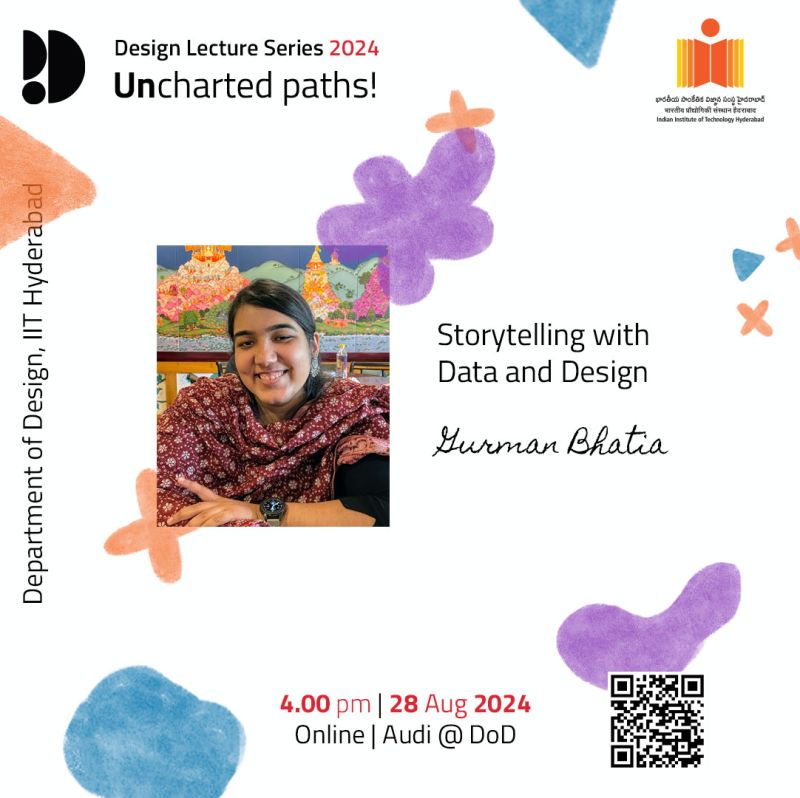
The Department of Design invites you to join the talk in the Design Lecture Series by Data Journalist and Designer Gurman Bhatia on 28th August 2024.
Talk abstract:
Storytelling with Data and Design
Data alone can be dry and unengaging, but when combined with visual storytelling, it can become impactful and memorable. This talk explores how to effectively use data within the realm of information design to craft compelling narratives. Drawing on lessons and real-world examples from journalism and design agencies, we’ll cover actionable tips for finding the right numbers, understanding their context, and presenting them ethically and engagingly.
Profile of the speaker:
Gurman Bhatia is the founder and director of Revisual Labs. She leads India’s first information design agency that helps clients communicate complex data effectively. With a Masters in Journalism from Columbia University and over nine years of experience in data journalism and visualisation, she has the passion for creating engaging and impactful stories with data, visuals, and code.
Gurman has worked with local, national, and international news outlets and non-profit organisations, such as Reuters, Hindustan Times, World Health Organisation, and Greenpeace, to produce award-winning data-driven projects and reports. She has also trained and mentored over one thousand people in data storytelling and information design skills, enabling them to leverage data for better decision-making and advocacy. Her mission is to democratise data literacy in India and empower people to use data as a tool for impactful and memorable communication.
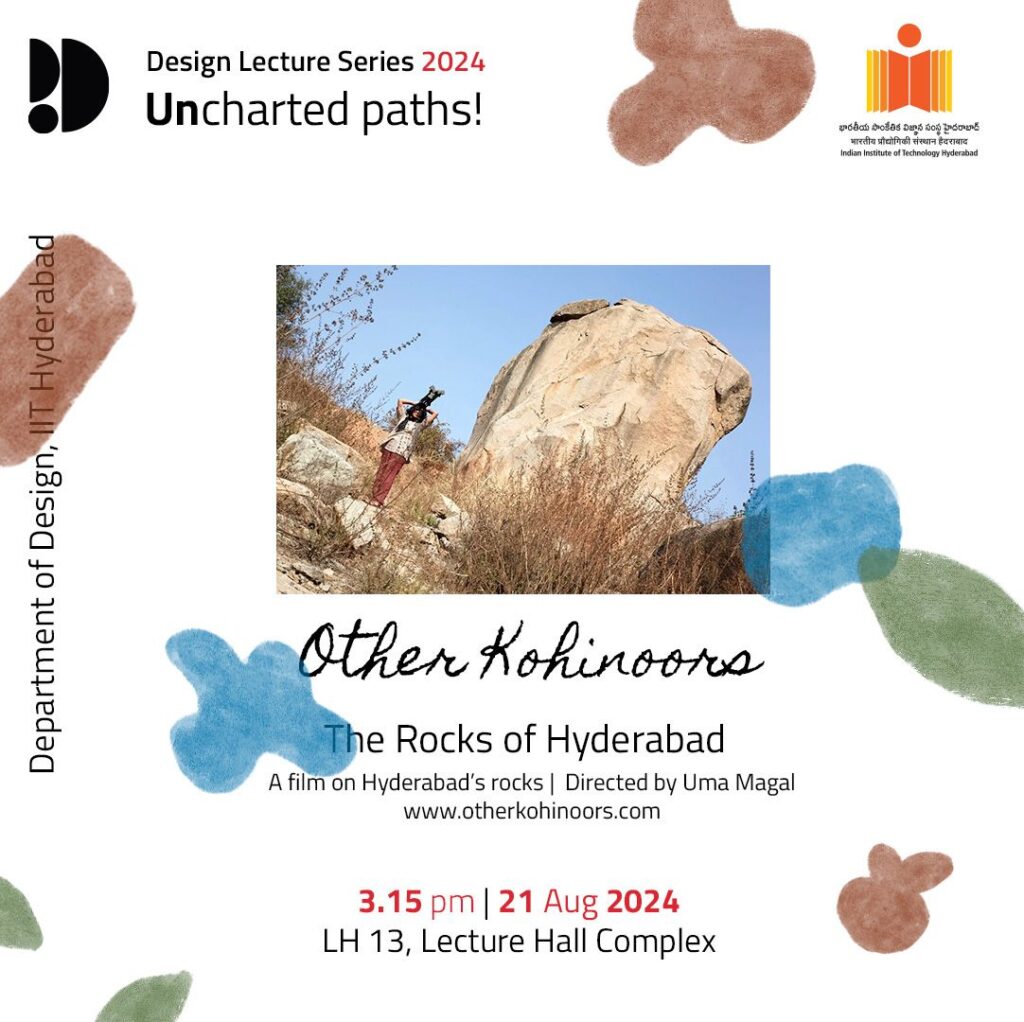
The Department of Design invites you to join the screening of the film “Other Kohinoors” directed by Uma Magal, as part of the the Design Lecture Series on 21st August 2024.
Film abstract:
Other Kohinoors
Other Kohinoors, The Rocks of Hyderabad is a love letter to Hyderabad and its unique terrain and culture. Hyderabad is an Indian city with a distinct history, language, culture, cuisine, and physical features. The film anchors itself in this regional tapestry showcasing how all of these are tied together with the rocks.
The profound interactive relationship between culture and nature in Hyderabad has as its ‘bedrock’, a respect for and dependence upon the landscape. This relationship is strikingly manifest in the city’s sensibility and culture: in its art, crafts, textiles, poetry, prose, architecture, literature, daily language, nomenclature, popular art, jokes, personal as well as its collective memory… In all these and more, the culture robustly, respectfully, affectionately acknowledges the beauty of the rocks and the role they play in the ecological health and distinct aesthetic identity of the city.
Hyderabad’s relationship with the rocks has changed remarkably within the last couple of decades. We have witnessed catastrophic destruction of these unique and irreplaceable ancient rock formations. This has been accompanied by the destruction of ecological sustenance that the terrain provided to the city, as well as a loss of the culture that is enmeshed with this terrain.
Profile of the director:
Uma Magal is the owner of Fenugreek Productions, a boutique studio for media and film work & training. She has a B.A. from Lady Shriram College, Delhi, an M.A. in Political Science from the University of Hyderabad and an M.A. in Communication from the Mass Communication Research Centre, J. M. I., Delhi. During her years in the US she earned an M.F.A in film production from Temple University. She is currently immersed in the outreach program for Other Kohinoors, the Rocks of Hyderabad and a fast growing conversation about celebrating and saving the unique rocky landscape of Hyderabad. She has also begun the research for a film on the Dublin-Irish landscape.
Film is presented by Sudarshan Vig, an avid art evangelist based in Hyderabad. He runs the company “Merlinwand” which is into personalised storybooks for children. He is also a professional photographer and cinematographer. He is usually connected with events connected to literature, music, dance and theatre. He also teaches photography to under-privileged children as part of the NGO “Art for Causes”. As a part of “Other Kohinoors”, he is the Asst. Producer of the film.
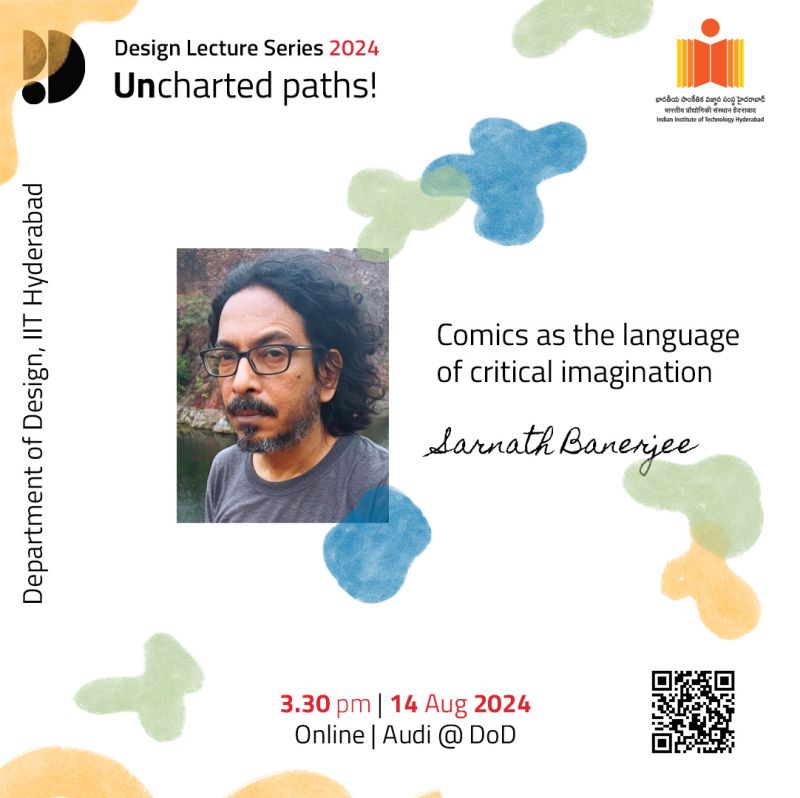
The Department of Design invites you to join the talk in the Design Lecture Series by Graphic Novelist Sarnath Banerjee on 14th August 2024.
Talk abstract:
Sarnath’s graphic works often center on everyday Indian experiences. Often anecdotal and autobiographical in nature, they are imbued with a rich, distinctive sense of humor. Banerjee describes himself as a recorder of a rapidly changing India. A theme that runs strongly in his work is the loss of architecture and history that comes with a developing country’s reach for modernisation. Through the talk, the author takes through his work and experiences of using comics as a tool for critical imagination.
Profile of the speaker:
Sarnath Banerjee has written five graphic novels (published by Penguin and Harper Collins) and is finishing his sixth, on a stipendium from the Berlin Senate. He has shown his work at several Biennales (Sao Paulo, Setouchi, Sharjah, Kochi, etc) and Art Fairs (Frieze, Arco, etc) and had several international solos and group shows in museums and centers of contemporary art. He also had public commissions, notably a series of billboards across London during the London Olympics titled the ‘Gallery of Losers.’ Banerjee has taught at several institutions (Summer Academy Salzburg, Princeton University, the University of Kassel, Vishvabharati University, Kochi Bienalle Foundation, Princess Drawing School, etc). Banerjee has been a CAST fellow at MIT, a Belknap fellow at Princeton, a fellow of the Akademie Schloss Solitude, the Indian Foundation for the Arts, and the MacArthur Foundation. He has written columns for national newspapers and founded an independent publishing house called Phantomville. He has studied at the University of Delhi and Goldsmiths College, London.
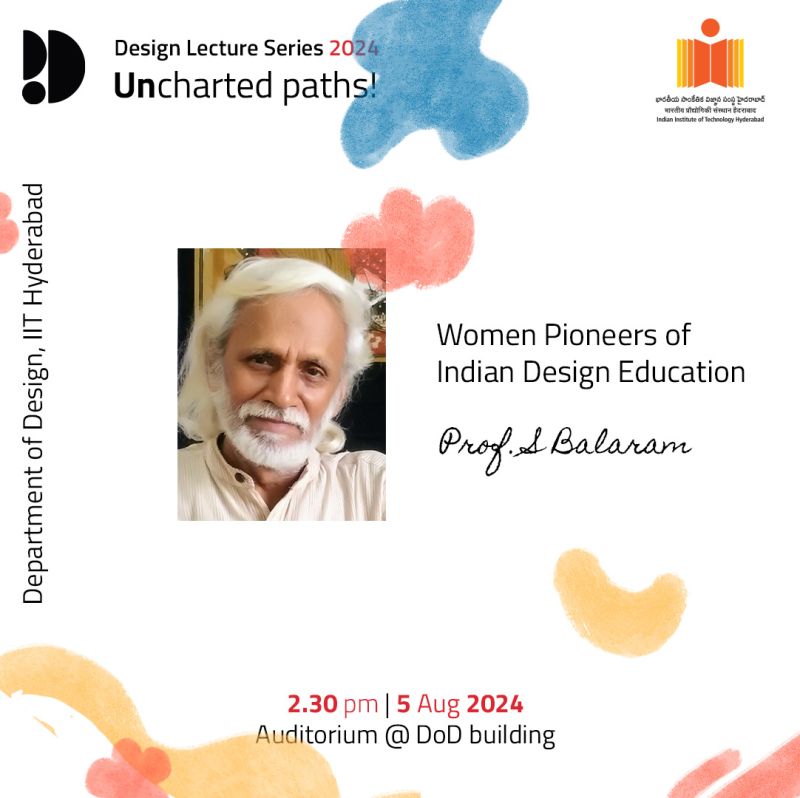
The Department of Design invites you to join the inaugural talk in the Design Lecture Series by Prof. S Balaram on 5th August 2024.
Talk abstract:
Regardless of increasing admissions of girls in design colleges, we hardly hear about prominent women designers in the country. The history of Indian design education is less known and even less so the role played by great women of India. Design education is more than a century old now in India and it’s high time that the seminal role played by women must be made known to the younger generation. There is urgency about hearing this from the “horses ‘ mouth” because the society today is riddled with fake news and fake histories being forced upon the people.
Profile of the speaker:
Prof. S Balaram is a Fellow of Royal Society of Arts , England. He is presently the Design Chair at DOT School of Design and Distinguished visiting Professor at the Shiv Nadar Institute of Eminence. He belongs to the pioneer group who commenced the design education in India through the National Institute of Design. As the Chairman of Design Extension, he was the first to establish design cells all over the country to assist small industries. He is the only Indian to be conferred the international “Ron Mace Designing for the 21st century” award. His other awards include the Grand jury award for the best Universal design education in the world by the International Association of Universal Designers and Helen Kellerl lifetime achievement award for outstanding contribution for the people with disabilities.
© 2025 Department of Design, IIT Hyderabad
Last Modified Date on 31st December 2025